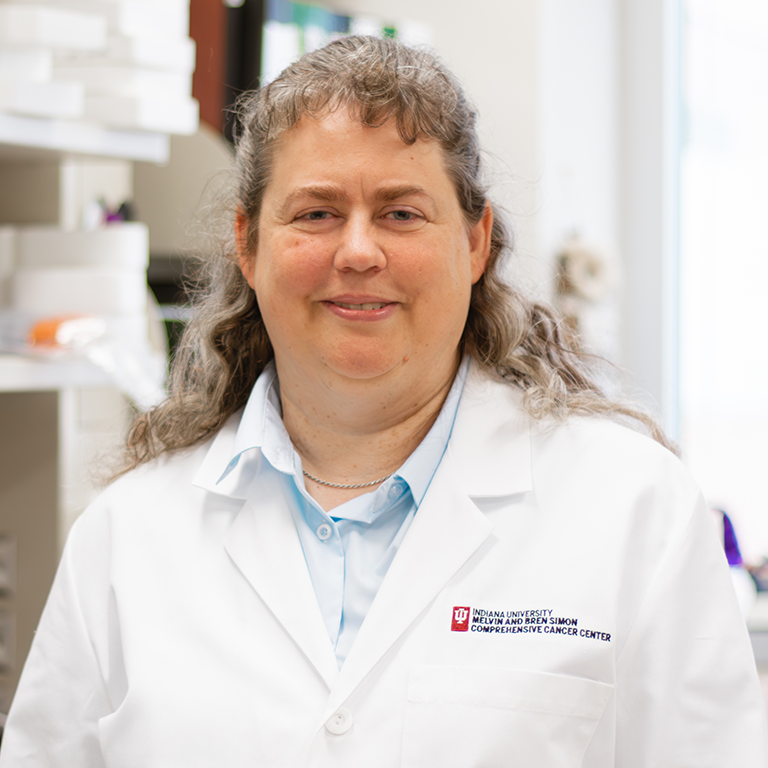Q&A with Dr. Karen Liby
By Michael Schug
December 12, 2023
By Michael Schug
December 12, 2023

Karen Liby, PhD, is in her new role as the Sidney and Lois Eskenazi Professor of Hematology-Oncology at IU School of Medicine and an investigator with the Experimental and Developmental Therapeutics research program at IU Simon Comprehensive Cancer Center. Read the announcement.
Here, she answers questions about what brought her to Indianapolis, what she’s most looking forward to and more.
The opportunity to work with dedicated colleagues and the possibility of advancing our drug discovery studies into the clinic with the goal of positively impacting the lives of patients.
The overall goal of my research is to develop new drugs for the prevention or treatment of cancer. We are studying how inflammation and the immune system can promote cancer, and we are developing drugs and combinations of drugs to intervene in this process.
I am excited about the FDA approval (February 2023) of omaveloxolone (SKYCLARYS™), the first and only drug approved for the treatment of Friedreich’s ataxia. The path to FDA approval was long and challenging but rewarding. Our successful and productive collaboration with Reata Pharmaceuticals serves as an effective model for partnerships between academic researchers and pharmaceutical companies.
Training and advising students are also highly rewarding aspects of my job. I enjoy helping graduate and undergraduate students learn how to design experiments, interpret data and convey results. I strive to teach them how to think: logically, independently and creatively. I encourage teamwork, communication and enjoying the process of discovery. Research can be fun as well as highly satisfying!
The opportunity to expand our lung and breast cancer research and advance our new program in neurofibromatosis 1 (NF1). We will also continue our studies in pancreatic cancer. I am also excited to be able to work with the CD3A (Cancer Drug Discovery and Developmental Accelerator ) team on our drug discovery projects, RXR agonists and NRF2 pathway activators and inhibitors.
Yes! As an old African saying rightly states, “If you want to go fast, walk alone. If you want to travel far, walk together.” The importance of collaboration and team science for drug discovery and translational research is fostered by the IU Simon Comprehensive Cancer Center, which provides an ideal environment for me and my students.
How we can design our experiments to be as relevant as possible so advances can be translated into the clinic. As Dr. Yousuke Yamada of Vanderbilt University has said, research should be “measured in medicines that change the lives of people” and not by “NIH grants obtained, publications, promotions, or awards.”
Cancer prevention is challenging. Priorities over the next five years include the identification of high-risk patients, safe and effective drugs, and relevant biomarkers to allow proof-of-concept clinical trials.
Research can take unexpected turns. Triterpenoids (natural products with anti-tumor properties) were first envisioned as cancer drugs, and the first phase I trials were in patients with cancer. When an unexpected improvement in renal function was observed in the cancer patients, Reata Pharmaceuticals pivoted to phase II and III trials in chronic kidney disease. The triterpenoid omaveloxolone was ultimately approved for the treatment of Friedreich’s ataxia, a rare genetic disease that causes progressive damage to the nervous system and subsequent challenges with movement.
By studying inflammation and the immune system, fundamental processes involved in the pathogenesis of numerous chronic diseases, research can and should pivot to follow the data and not the original hypothesis.
It definitely was a process that required multiple trips between Indianapolis and East Lansing, Mich., to coordinate moving a lab, myself, the assistant professor and four students who, I am thrilled to say, chose to move with me. Despite the difficult housing market, I found a house here and just recently closed on my house in Michigan. We are in the process of unpacking the lab so we can start experiments.
Hiking, gardening, and reading.